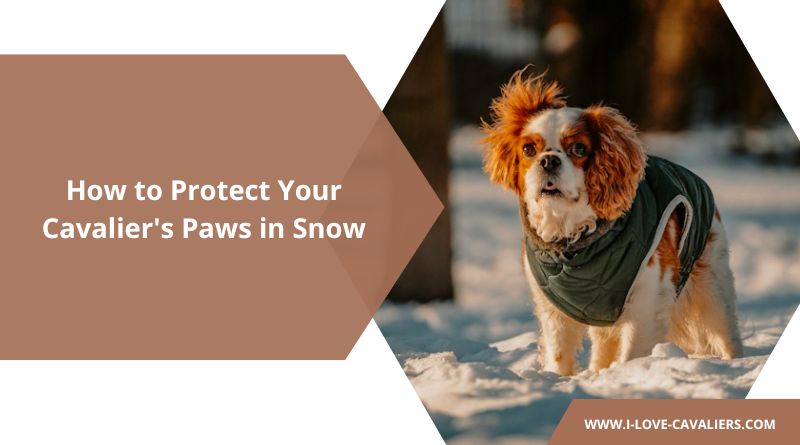Winter weather can be tough on your pet’s paws, especially if they spend a lot of time outdoors. The cold, dry air can cause their paw pads to become cracked and chapped, which can be painful and uncomfortable. Additionally, snow and ice can accumulate between their toes and cause irritation or frostbite.
How to Protect Your Cavalier’s Paws in Snow and Wintery Weather
Winter can be a magical time for you and your Cavalier, but it can also be tough on their paws. Snow, ice, and cold temperatures can cause damage, discomfort, and even injury.
Use Dog Booties
Dog booties are a great way to protect your Cavalier’s paws from the cold, ice, and salt on the roads. They come in a variety of styles and sizes, so you can find the perfect fit for your pup. Make sure to choose a pair that is durable, waterproof, and has good traction.
Apply Paw Balm
Paw balm is a moisturizing and protective ointment that can help prevent your Cavalier’s paws from drying out and cracking in the cold weather. Look for a balm that contains natural ingredients like beeswax, shea butter, and coconut oil. Apply it to your pup’s paws before and after walks.
Paw Care Post-Walks
After each walk, make sure to wipe your Cavalier’s paws with a warm, damp cloth to remove any snow, ice, or salt. You can also soak their paws in warm water for a few minutes to help soothe any irritation. Dry their paws thoroughly, especially between the toes, to prevent any moisture from causing infections.
Paw Grooming
Regular grooming is important for paw health. Keep your Cavalier’s nails trimmed to prevent them from getting too long and causing discomfort or injury. You can also trim the fur around their paws to prevent ice and snow from getting stuck between their toes.
Shorten Walks
In extremely cold weather, shorten your walks to prevent your Cavalier’s paws from getting too cold and potentially causing frostbite. If your pup starts to lift their paws or show signs of discomfort, it’s time to head back inside.
Hydration
Make sure your Cavalier is drinking enough water during the winter months. The dry air and cold temperatures can cause dehydration, which can lead to dry and cracked paws. Offer your pup water regularly and consider adding a humidifier to your home.
Check Paws Regularly
Check your Cavalier’s paws regularly for any signs of damage or injury. Look for cracks, cuts, and signs of irritation. If you notice anything unusual, contact your vet for advice.
Overall Warmth
Finally, make sure your Cavalier is warm and comfortable during the winter months. Consider investing in a warm coat or sweater, especially if your pup has a short coat. Keep your home warm and cozy, and provide plenty of soft blankets and pillows for your pup to snuggle up on.
What Happens to Dog Paws in Snow?
When the temperature drops and snow starts to fall, it’s important to take extra care of your Cavalier’s paws. Here are some common issues that can affect your dog’s paws in winter:
Cold Burn/Frostbite
Just like humans, dogs can suffer from cold burn and frostbite. When your dog’s paws are exposed to extremely cold temperatures, the skin and tissue can become damaged. This can lead to pain, swelling, and even tissue death. Frostbite is more likely to occur in dogs with thin fur or those with small paws.
Dryness and Cracking
The cold, dry air in winter can cause your dog’s paws to become dry and cracked. This can be uncomfortable and even painful for your dog. If left untreated, dryness and cracking can lead to infections.
Slip and Falls
Snow and ice can make sidewalks and roads slippery, which can increase the risk of slips and falls for your dog. This can lead to injuries such as sprains, strains, and even broken bones.
Irritation from Salt and Chemicals
Many cities and towns use salt and other chemicals to melt snow and ice on roads and sidewalks. While these substances can help keep us safe, they can be harmful to your dog’s paws. Exposure to salt and chemicals can cause irritation, burns, and even poisoning if ingested.
Cuts and Abrasions
Sharp objects such as rocks, ice, and debris can cause cuts and abrasions on your dog’s paws. These injuries can be painful and increase the risk of infections.
